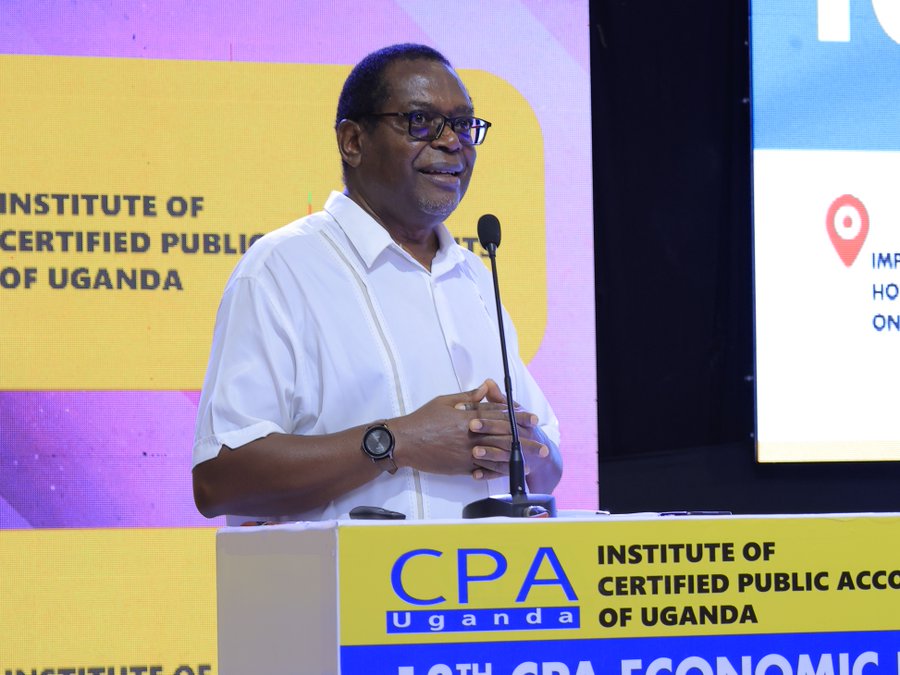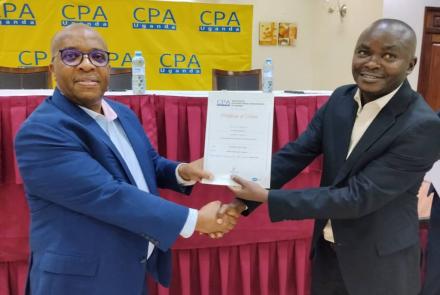By Joan Abaasa
Communication Officer, ICPAU
James Wasula, Executive Director of Afrigo Band and the Parliamentary Forum for Creative Industries has highlighted the untapped economic power of creative sectors such as music, fashion, film and crafts.
He noted that although these industries are rich in potential and in employment opportunities, they remain underutilised due to fragmented policies and limited coordination across government institutions.
Wasula called for the establishment of an independent Creative Industries Policy, separate from the broader cultural policies. This, he argued, would enable proper planning, coordination, and investment. He criticised the disconnect between tourism and culture, which often leaves cultural development underfunded and unprioritised.
He also raised concerns about outdated colonial-era laws that stifle the growth of creative expression and event organisation through excessive regulation. Instead, he recommendeda shift to more supportive frameworks that promote storytelling, cultural preservation, and innovation. According to Wasula, content creation, especially in film and music can shape societal values and foster national identity, particularly among young people.
Wasula further proposed the concept of “creative cities,” where cultural heritage influences architectural design and urban planning. He urged the government to allocate a percentage of the national budget to the creative sector, as recommended by the African Union.
“Creativity is a resource,” he declared. “It is time to organise, support, and invest in it intentionally,” said Wasula.
Wasula was delivering a presentation on harnessing economic gains from the culture and creative industries at the 13th CPA Economic Forum, on 11 July 2025.
Echoing Wasula’s sentiments, Aisha Nabwanika, CEO of Ewaffe Cultural Village delivered a passionate address on the economic and social importance of cultural industries. She described the creative sector as a dynamic ecosystem that includes music, dance, theatre, crafts, culinary arts, film, and cultural heritage. Despite its potential, she noted that it remains undervalued and misunderstood.
Nabwanika shared how her organisation, Ewaffe Cultural Village offers visitors immersive cultural experiences such as traditional cooking, crafts, and storytelling. These experiences attract both local and international tourists while providing income for local communities. She emphasised that cultural heritage is not just about preservation, but it is also a platform for entrepreneurship and job creation.
She stressed the urgency for policies that protect cultural intellectual property and greater investments in creative hubs, cultural centres, and youth talent development. Nabwanika called on both policymakers and private investors to recognise culture not as a luxury, but as a strategic asset.
“Let us invest in who we are,” she urged. “Because culture is not just heritage, it is opportunity, identity, and business,” she added.
Renowned actor and filmmaker Matthew Nabwiso presented a case for the role of storytelling and film in nation-building and economic development. Drawing from his experience in the film industry, Nabwiso revealed the extensive job creation capacity within the sector. He shared how producing 88 episodes over four years led to the employment of 85 permanent staff and hundreds of part-time workers During production of the hit television series, Sanyu.
He stressed that film production supports a wide range of sectors, making it one of the most economically inclusive industries.
Nabwiso added that storytelling is not just entertainment but a means of shaping national identity and global perception. He noted that countries like the United States have used film to brand themselves globally, and Uganda must do the same to tell its own stories. If left to foreigners, he warned, local narratives risk distortion or erasure.
He expressed concern about the lack of funding and infrastructure for filmmakers and called for strategic partnerships and investments to support the industry’s growth. He shared historical stories that are yet to be told on screen, including powerful narratives rooted in Uganda’s royal and cultural history, and stressed the importance of documenting these stories from an authentic perspective.
The CPA Economic Forum is ICPAU’s flagship platform for addressing critical economic issues that impact the wider business landscape. Over the years, ICPAU has consistently provided policy recommendations and tax proposals to the government through the Ministry of Finance, Planning and Economic Development, contributing to meaningful national reforms.
The 13th CPA Economic Forum is organised in partnership with Bank of Uganda, Uganda National Oil Company (UNOC), National Agricultural Research Organisation (NARO), Uganda Printing and Publishing Corporation (UPPC), Electoral Commission, Centenary Bank, Uganda Electricity Generation Company Limited (UEGCL), National Social Security Fund (NSSF), Stanbic Bank, PKF Uganda, Prudential Assurance Uganda Limited and MTN Uganda.
END




